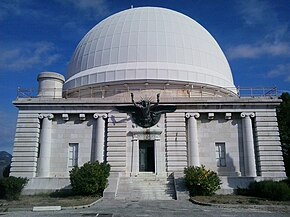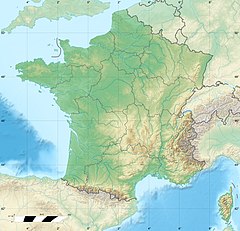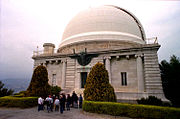Nice Observatory
 The Nice Observatory | |||
| Alternative names | 020 NI | ||
|---|---|---|---|
| Observatory code | 020 | ||
| Location | Mont Gros, Nice, France | ||
| Coordinates | 43°43′39″N 7°17′57″E / 43.72744°N 7.29907°E | ||
| Altitude | 372 m (1,220 ft) | ||
| Established | 1878 | ||
| Website | www | ||
| Telescopes | |||
| |||
| | |||
The Nice Observatory (French: Observatoire de Nice) is an astronomical observatory located in Nice, France on the summit of Mount Gros. The observatory was founded in 1879, by the banker Raphaël Bischoffsheim. The architect was Charles Garnier, and Gustave Eiffel designed the main dome.
In 1886 the largest refracting (i.e., with an objective lens rather than a mirror) telescope in the World made its debut at Nice Observatory, the Grand Lunette.[1]
Description[edit]
The 77 cm (30 in) refractor telescope[2] made by Henry and Gautier became operational around 1886–1887,[2][3] was the largest in a privately funded observatory, and the first at such high altitude (325 m or 1,066 ft above sea level). It was slightly bigger in aperture, several metres longer, and located at a higher altitude than the new (1895) 76 cm (30 in) at Pulkovo observatory in the Russian Empire, and the 68 cm (27 in) at Vienna Observatory (completed early 1880s).[2] In the records for the largest refracting telescopes, all three were outperformed by the 91 cm (36 in) refractor installed at the Lick Observatory at 1,283 m altitude in 1889.
As a scientific institution, the Nice Observatory no longer exists. It was merged with CERGA in 1988 to form the Côte d'Azur Observatory, which often is still referred to as "Nice Observatory".
The Nice Observatory was featured in the 1999 film Simon Sez. It was also the setting for the title scene in the 2014 Woody Allen flick Magic in the Moonlight.
Directors[edit]
- Henri Perrotin (1880–1904)[4]
- General J. A. L. Bassot (1904–1917)[5]
- Gaston Fayet (1917–1962)[5][6]
- Jean-Claude Pecker (1962–1969)[7]
- Philippe Delache (1969–1972)[8]
- Jean-Paul Zahn (1972–1975)
- Philippe Delache (1975)[8]
- Jean-Paul Zahn (1975–1981)
- Raymond Michard (1981-1989)
- Philippe Delache (1989–1994)[8]
- José Pacheco (1994–1999)
- Jacques Colin (1999–2009)
- Farrokh Vakili (2009–2015)
- Thierry Lanz (2015-2021)
- Stéphane Mazevet (since 2021)
Gallery[edit]
-
The 77-centimetre (30 in) refractor at Nice Observatory, when built the world's largest, longest, and highest refracting telescope [2]
-
The Bischoffsheim cupola
See also[edit]
- List of largest optical refracting telescopes
- List of largest optical reflecting telescopes
- List of astronomical observatories
References[edit]
- ^ "1914Obs....37..245H Page 248". articles.adsabs.harvard.edu. Retrieved 2019-10-05.
- ^ a b c d The Observatory, "Large Telescopes", Page 248
- ^ British university observatories, 1772–1939 By Roger Hutchins;page 252
- ^ The Observatory. Vol. 25. Editors of the Observatory. 1904. pp. 171, 176.
- ^ a b Popular astronomy. Vol. 25. Goodsell Observatory of Carleton College. 1917. pp. 411, 480.
- ^ "Case Newsletter". Cooperation on Archives of Science in Europe. University of Bath. April 2001. Archived from the original on 7 February 2007. Retrieved 23 July 2010.
- ^ Jean-Claude Pecker; Jayant Vishnu Narlikar, eds. (2006). Current issues in cosmology. Cambridge University Press. p. i. ISBN 978-0-521-85898-4. Retrieved 23 July 2010.
- ^ a b c Bonnet, R. M. (1996). Janine Provost, Francois-Xavier Schmider (ed.). "The scientific achievements of Ph. Delache". Sounding solar and stellar interiors. Dordrecht Kluwer Academic Publishers: 222. Bibcode:1997IAUS..181..221B. ISBN 0792348389.
External links[edit]
- Monographie de l'observatoire de Nice by Charles Garnier


![The 77-centimetre (30 in) refractor at Nice Observatory, when built the world's largest, longest, and highest refracting telescope [2]](http://upload.wikimedia.org/wikipedia/commons/thumb/0/01/Grande_Lunette_Nice.jpg/180px-Grande_Lunette_Nice.jpg)
